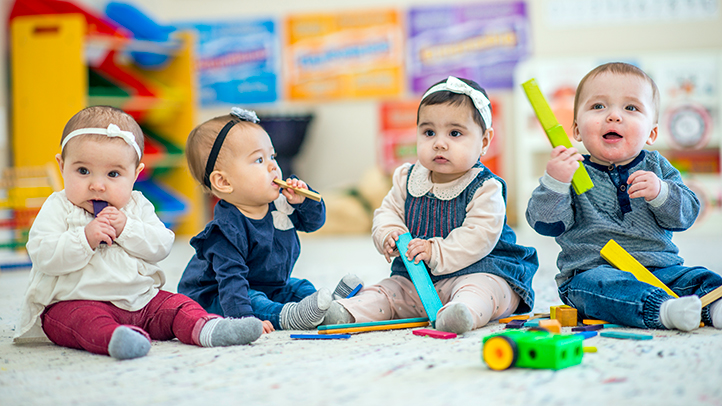You might have heard of herd or community immunity, when a vaccinated portion of a population (aka "the herd") provides unvaccinated people with some protection from a contagious disease. Thanks to vaccines, many dangerous diseases that were once common in the United States are now rare, and herd community helps prevent them from spreading.[1]
If you were on the fence about vaccinating your little one, herd immunity may sound like a pretty safe bet — and a way to keep your child safe from vaccine-preventable diseases without having to subject him to shots — but it's far from a sure thing.
Here's why it’s so important for all of us to do our part to maintain herd immunity in our communities, plus why vaccinating your child is still critical for his health.
Herd immunity, also known as community immunity, is when a significant portion of a population (“the herd”) provides unvaccinated people with some protection from a contagious disease. Thanks to vaccines, many diseases that were once widespread in the U.S., such as diphtheria, mumps, and polio, are now rare.
Herd immunity is important because it helps reduce the spread of infection so these diseases become less common. As a result, people who can’t get vaccinated (such as those with weakened immune systems or newborns) have extra protection.
It’s still important to vaccinate your child even though herd immunity exists, though. Many of these illnesses are still common in other parts of the world and could easily be brought to the U.S. by just one traveler — if your child were unvaccinated, he’d be at risk should he come into contact with the disease.
What is herd immunity?
Herd or community immunity is when a large enough portion of the population is immune to a disease and therefore indirectly protects those who are not immune. That’s because if the majority of people in a community are immune to an illness, it will have a harder time spreading: Those who are still at risk will be less likely to come into contact with someone who is contagious.[2]
Herd immunity often occurs through vaccinations. Many diseases that children are regularly vaccinated for today — including measles, mumps, rubella, pneumococcal disease, whooping cough, and even chickenpox — were once widespread. But now that those immunizations have become standard, our society has achieved herd immunity against the illnesses, and they are much rarer.
And in the cases of diseases like polio and diphtheria, herd immunity is so strong that the diseases have almost disappeared completely.
"We need to protect people who can't get the vaccine for a valid reason, like age, or the immunocompromised who can't get the live virus vaccines, by surrounding them with people who are vaccinated," says Gina Posner, M.D., a board-certified pediatrician at MemorialCare Medical Group in Fountain Valley, California, and a member of the What to Expect Medical Review Board.
Read This Next
Vaccines aren't the only way to achieve herd immunity. For diseases where a vaccine doesn’t exist, herd immunity can happen if enough people become infected. But in this case, achieving herd immunity requires many, many people to catch the disease first, which can also be dangerous.
Want more tips and info about keeping your baby and whole family healthy? Find it in the What to Expect app.
Why is herd immunity important?
Herd immunity keeps people and communities safe by significantly reducing the spread of infections. In fact, childhood vaccinations have made it possible for the U.S. to achieve herd immunity for many diseases that were once common, and sometimes deadly. These include:[3]
- Diphtheria
- Chickenpox
- Mumps
- Rotavirus
- Pneumococcal disease
- Whooping cough
- Measles
- Hib
- Rubella
- Hepatitis A
- Hepatitis B
- Polio
The fact that these diseases are now rare and not easily spread means everyone is better protected against them. That includes those who aren't able to be vaccinated (such as pregnant women or people with weakened immune systems) or who haven't yet been vaccinated, like very young infants.
Take Hib (Haemophilus influenzae type b), a potentially deadly virus that can cause meningitis and lead to permanent brain damage. About 20,000 children younger than 5 developed severe Hib disease in the U.S. each year, and about 1,000 died before a vaccine became available in 1985. Since herd immunity was achieved, the incidence of infection has fallen by 99%.[4]
Or look at diphtheria, a lethal bacterial infection that can cause trouble breathing and heart failure. More than 15,000 Americans died from the disease in 1921 alone, before we had a vaccine and were able to achieve herd immunity. But reported cases in the U.S. are now extremely low.[5]
Herd immunity can also keep outbreaks at bay, but it works best when everyone (or as many people as possible) are vaccinated against a disease. When the first measles case to hit the U.S. since 2000 struck in 2005, it came from one unvaccinated U.S. resident who had contracted the illness in Europe, where vaccination rates are lower. It wasn’t long before U.S. kids who hadn’t gotten the measles vaccination also ended up getting infected.
As anti-vaccine sentiment has grown in some communities in recent years, measles outbreaks have occurred more frequently. There have already been more than 1,000 measles cases in the U.S. so far in 2025 and three deaths, compared to just 16 cases in 2024, according to the CDC.[6]
Why is it so important for your child to get vaccinated?
If we now have herd immunity for many once-common childhood illnesses, why bother continuing to vaccinate for them? Turns out, there are plenty of important reasons.
Most of the diseases we vaccinate for still exist — and immunizations keep your child safe
Immunizations have helped us achieve herd immunity for many diseases to the point where infections are rare. But many of these illnesses are still common in other parts of the world and can easily be brought back to the U.S.
It only takes one person to get a disease and spread it to others who haven’t been vaccinated against it. And if your child hasn’t gotten the vaccine for that illness, he could be infected.
Vaccinating your child helps protect others too
Herd immunity protects people who aren’t able to get vaccinated against a disease, including those with serious allergies or with conditions that affect the immune system — like HIV/AIDS and cancer.
It also protects newborns who aren’t yet old enough to get vaccinated, along with pregnant women who may not be eligible for some immunizations. If you’re planning to have another baby at some point, vaccinating your child now will help keep your next one safe.
Herd immunity only works when we all opt in
In the case of measles, 95% of the community needs to be vaccinated in order to achieve herd immunity, according to the World Health Organization.[7] Fewer immunizations means higher infection rates — and the change can happen quickly. The measles outbreak in Texas has led to more than 800 cases, including the deaths of two school-aged children who were unvaccinated.
Herd immunity doesn't apply to every vaccine
Community immunity doesn't apply to every disease, specifically tetanus, which is a vaccine-preventable disease that's not contagious. (Instead, tetanus bacteria enters the body through a wound or cut.)
So why vaccinate your child with the DTaP shot? Because if your child hasn't been immunized, it doesn't matter if everyone else is — he still won't be protected.
What’s more, some vaccines protect your child against diseases for which we don’t currently have herd immunity. For example, experts believe it's unlikely that we'll achieve community immunity against COVID-19 due to vaccine hesitancy, uneven distribution, and the fact that you can be reinfected.
The COVID-19 vaccine offers strong protection against severe illness, but it isn't 100% effective at preventing infection, especially as new variants evolve and spread. That's why the CDC recommends that anyone who has already completed the initial vaccine series also get an annual COVID vaccine, which targets the dominant strains that season.[8]
Herd immunity makes for a safer future
Vaccinating your child to preserve the herd immunity we currently have increases the odds that herd immunity will still exist for your grandchildren, their grandchildren, and beyond.
Want more informations about vaccinating your baby? Find it on the What to Expect app.
What would happen if we stopped giving children vaccines?
The simple answer is that outbreaks would become more common. Before long, herd immunity could start to erode and might eventually disappear altogether — leading to many, many more people getting sick.
Remember, the herd immunity that we currently have against many diseases in the U.S. only exists because people continue to get vaccinated. Many of these vaccine-preventable diseases are still widespread elsewhere, and it only takes one non-immunized person to bring a disease to the U.S. And once it’s here, it could easily spread to anyone who isn't vaccinated.
“We’re vaccinating over here!” says What to Expect Community user Lanon. “Totally makes sense to wonder about the risks because there is so much conversation about it these days. To me the risks of having an unvaccinated child get something like whooping cough or measles far outweigh the risks of a side effect of a vaccine.”
If large enough numbers of kids stopped getting vaccines, that could lead to major disease outbreaks. It’s upsetting to think about, but stopping vaccinations would ultimately put many, many more children at risk. "If we stop vaccinating our children, herd immunity will no longer exist," says Dr. Posner.
In short, a future without vaccines would be dangerous and bleak. The good news is that routine shots have made it possible for us to achieve herd immunity against many diseases and protect our kids and communities.


















































